新目标八年级英语上册_Unit1课件--精华版
合集下载
新版八年级英语上册unit1--Where_did_you_go_on_vacation_复习课件
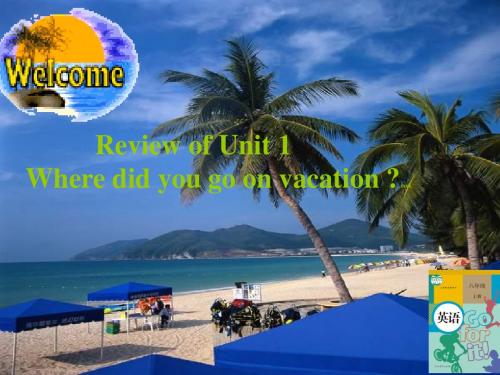
1.most of the time意为“大部分时间”,其中most 为代词,意为“大部分;大多数”。 拓展most of…意为“……中的大多数”,它作主 语时,谓语动词取决于most of后所修饰的名词。 a. Most of us are going to the park. 我们大多数人要 去公园。 2.Still no one seemed to be bored. 仍然没有 人感到烦闷。 1)seem意为“好像;似乎;看来”,是个连系 动词,构成的短语有:
复合不定代词:
some
人 someone
any
every
no
anyone everyone no one
物 something anything everything nothing
few与little 的区别
肯定 可数 不可数 a few a little 否定 few little 许多 quite a few/not a few quite a little/ not a little
Where did you go on vacation?
visited a museum
went to the mountains
went to the movies
stayed at home
visited grandparents
go on vacation 1.去度假 2.待在家里 stay at home went to the mountains 3.去爬山 go to the beach 4.去海滩 5.参观博物馆 visit the museums 6.看望我叔叔 visit my uncle 7.去参加夏令营 go to the summer camp 8.一些特别的东西 something/ anything interesting 9. 一些有趣的地方 anywhere interesting 10.为……而学习 study for tests
初中英语八年级上册 全册Unit 1-10 课件 人教新目标版(付,1094)
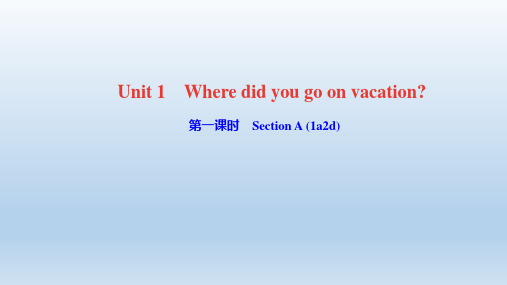
( B)12.________ swept the floor yesterday.It is so clean.
A.Everyone B.Someone C.Anyone D.No one
C
( )13.—How was your vacation?
—________! I had a wonderful time there.
A.sounds B.seems
C.feels
D.smells
( C )15.The stories are very ________. And I'm ________ with them.
A.boring; boring B.bored; bored C.boring; bored D.bored; boring
二、根据句意,用所给词的适当形式填空。
6.—Are
there
anything __________(something)
interesting
in
this
shop?
—Yes. You can go and choose(选择) some gifts for your friends.
7.I saw many ____p_h_o_t_o_s(photo) on the wall of her bedroom.
something
for
his
parents,but
nothing __________for himself.
3.Nowadays I can choose online courses and study by _______m_.yself
4.Yesterday,his neighbor's ______h_elanisd(下蛋) four eggs altogether.
A.Everyone B.Someone C.Anyone D.No one
C
( )13.—How was your vacation?
—________! I had a wonderful time there.
A.sounds B.seems
C.feels
D.smells
( C )15.The stories are very ________. And I'm ________ with them.
A.boring; boring B.bored; bored C.boring; bored D.bored; boring
二、根据句意,用所给词的适当形式填空。
6.—Are
there
anything __________(something)
interesting
in
this
shop?
—Yes. You can go and choose(选择) some gifts for your friends.
7.I saw many ____p_h_o_t_o_s(photo) on the wall of her bedroom.
something
for
his
parents,but
nothing __________for himself.
3.Nowadays I can choose online courses and study by _______m_.yself
4.Yesterday,his neighbor's ______h_elanisd(下蛋) four eggs altogether.
新目标英语八年级上Unit 1 课件Unit1 单词(共20张PPT)
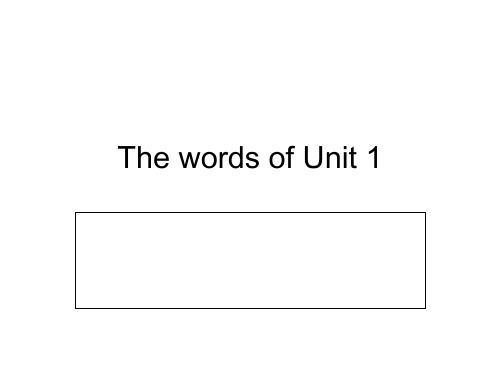
• try [traɪ] v.尝试;设法;努力 • try to do sth. 尽力做某事 • eg. Please try to finish this work in ten minutes. • 请尽量在10分钟内完成这项工作。 • try doing sth. 尝试做某事 • eg.Why don't you try riding a bike to go to school? • 为什么不尝试骑自行车去学校呢?
• eg. Quite a few students go to school by bike. • 相当多学生骑自行车上学。 • quite a little 意为“相当多”,修饰不可数名词,相当
于 much。 • eg. He drank quite a little water. • 他喝了相当多的水。
• below [bɪ'ləʊ] prep.低于;在...下面adv.在下面 • under (正)下方 • There is a lake below the mountain. • 山下有一个湖。 • There is a cat under the table. • 桌子底下有一只猫
• enough [ɪ'nʌf] adj.足够的adv.足够地;充分地 • 1.既可以放在名词前也可以放在名词后 • eg. I don't have enough money to buy this skirt.
句是真正的主语。 • eg.It seems that no one knows what
happened in the park. • 似乎没有人知道公园发生了什么事。
• someone ['sʌmwʌn] pron.某人;有人
• eg. Quite a few students go to school by bike. • 相当多学生骑自行车上学。 • quite a little 意为“相当多”,修饰不可数名词,相当
于 much。 • eg. He drank quite a little water. • 他喝了相当多的水。
• below [bɪ'ləʊ] prep.低于;在...下面adv.在下面 • under (正)下方 • There is a lake below the mountain. • 山下有一个湖。 • There is a cat under the table. • 桌子底下有一只猫
• enough [ɪ'nʌf] adj.足够的adv.足够地;充分地 • 1.既可以放在名词前也可以放在名词后 • eg. I don't have enough money to buy this skirt.
句是真正的主语。 • eg.It seems that no one knows what
happened in the park. • 似乎没有人知道公园发生了什么事。
• someone ['sʌmwʌn] pron.某人;有人
人教版新目标八年级Unit-1-Section-B-2b详解-PPT
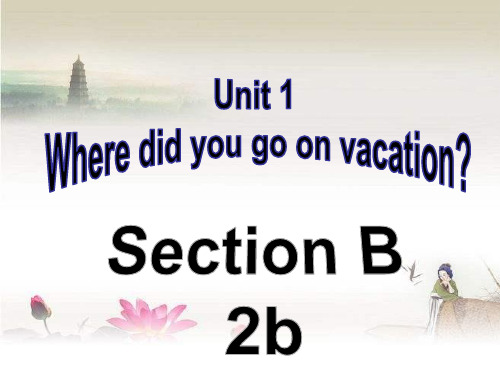
What a difference a day makes! My father and I decided to go to Penang Hill today. We wanted to walk up to the top, but then it started raining a little so we decided to take the train. We waited over an hour for the train because there were too many people. When we got to the top, it was raining really hard. We didn’t have an umbrella so we were wet and cold. It was terrible! And because of the bad weather, we couldn’t see anything below. My father didn’t bring enough money, so we only had one bowl of rice and some fish. The food tasted great because I was so hungry!
lunch. (A )2. The boy felt like his leg was broken.
2. And because of the bad weather, we couldn’t see anything below. because of意为“因为”,后跟名词。 e.g. They didn’t go fishing because of the bad weather. 因为天气不好所以他们没有去钓 鱼。
lunch. (A )2. The boy felt like his leg was broken.
2. And because of the bad weather, we couldn’t see anything below. because of意为“因为”,后跟名词。 e.g. They didn’t go fishing because of the bad weather. 因为天气不好所以他们没有去钓 鱼。
八年级英语上册Unit 1 Section A (Grammar Focus-3c)课件

3b Fill in the blanks in the e-mail message
with the words in the box.
anything everything nothing everyone no one Dear Bill, anything interesting? Did ________ everyone in How was your vacation? Did you do ________ the family go with you? I went to a friend's farm in the countryside with my family. Everything ________ was great. We fed some hens and saw some baby pigs.
词汇练习 I. 翻译下列词组。 decide to do sth. 1. 决定做某事 ___________________ help sb. (to) do sth. 2. 帮某人做某事 ___________________ visit the Palace Museum 3. 参观故宫 ___________________ be on vacation 4. 在度假 ___________________ go to the mountains 5. 去爬山 ___________________ go shopping 6. 去购物 ___________________
(6)anyone 意为“任何人”,常用于否定句或疑问句中,也可以用于状语从 句中。 (7)everyone 意为“每个人;所有人”,常用于肯定句中。 (8)no one 意为“没有人”。 【注意】复合不定代词作主语时,谓语动词用第三人称单数形式。 形容词修饰复合不定代词时,常置于复合不定代词之后。
八年级英语上册Unit 1 SectionB 课件
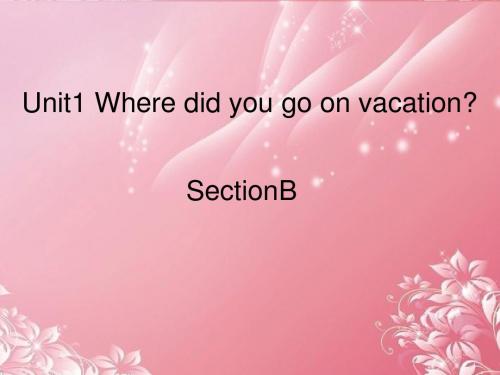
2.What activities do you find enjoyable?
2b. Read Jane’s diary about her vacation and answer the questions.
• 1.What acபைடு நூலகம்ivities do you find enjoyable? 你发现什么活动让人快乐?(P5) • 1)activities是activity的复数形式,意为 “活动”。 • Students like outdoor activities.(翻译) • ___________________ • 2)enjoyable形容词,意为“愉快的;快乐 的”。 enjoy 动词,喜欢,享受 I’m sure we will have an enjoyable vacation.(翻译) • 我确信我们将会有一个愉快的假期。
• 4.My sister and I tried paragliding.姐姐和我尝试 了滑翔伞运动。(P5) • try此处用作及物动词,其后常接名词、动名词或 不定式,意为“尝试;试图,设法;努力” • She is trying my bicycle. • 她正在试骑我的自行车。 • 拓展: • 1)try也可用作不及物动词,意为“尝试;努 力”。 • I don’t think I can do it,but I’ll try.我认为我做 不了它,但是我要尝试一下。 • 2)try也可用作名词,意为“尝试”,常用短语 “have a try”,意为“试一试”。 • I’m going to have a try.我想试一试。
2a. Discuss the questions with your partner.
1. What do people usually do on vacation? go shopping ,go hiking , go swimming, go fishing , eat good food…
2014新目标八年级英语上册Unit1_全单元课件
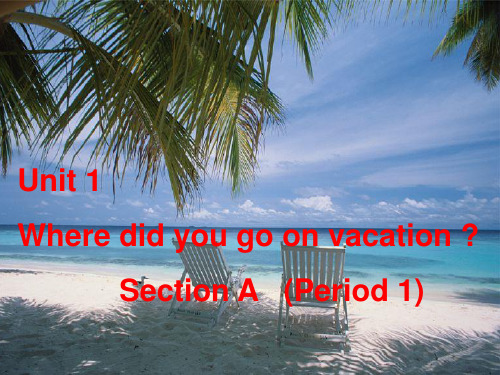
e c d f g
f 1. stayed at home ___ 2.went to New York City ____ b g 3. visited my uncle___ 4. went to summer d camp ___ 5. went to the c mountains _____ a 6. went to the beach __ e 7. visited museums___
Grace
go to Central Park? buy anything special? play volleyball?
Kevin
swim? meet anyone interesting? do anything interesting ?
Julie
study for tests ? go out with anyone ?
She stayed at home and cooked .
beach
Where did they go on vacation ?
They went to the beach .
mountains
Where did they go on vacation? They went to the mountains.
museum
Where did they go on vacation ? They visited museums.
summer camp (夏令营)
camp 野营;营地
Where did they go on vacation? They went to summer camp.
went to the mountains
如: He found something strange but interesting. 他发现了一些奇怪但却有趣的事情。 Do you have anything to say ? 你有话要说吗? I can’t meet anybody on the island. 在岛上,我没遇见任何人。
f 1. stayed at home ___ 2.went to New York City ____ b g 3. visited my uncle___ 4. went to summer d camp ___ 5. went to the c mountains _____ a 6. went to the beach __ e 7. visited museums___
Grace
go to Central Park? buy anything special? play volleyball?
Kevin
swim? meet anyone interesting? do anything interesting ?
Julie
study for tests ? go out with anyone ?
She stayed at home and cooked .
beach
Where did they go on vacation ?
They went to the beach .
mountains
Where did they go on vacation? They went to the mountains.
museum
Where did they go on vacation ? They visited museums.
summer camp (夏令营)
camp 野营;营地
Where did they go on vacation? They went to summer camp.
went to the mountains
如: He found something strange but interesting. 他发现了一些奇怪但却有趣的事情。 Do you have anything to say ? 你有话要说吗? I can’t meet anybody on the island. 在岛上,我没遇见任何人。
初中英语人教版八年级上册Unit 1 .-阅读课件
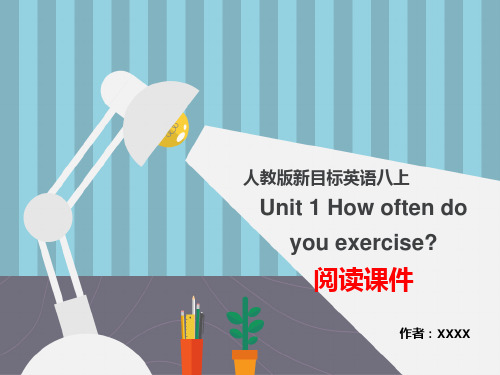
现方式做保护处理对用户上传分享的文档内容本身不做任何修改或编辑并不能对任何下载内容负责
人教版新目标英语八上
Unit 1 How often do you exercise?
阅读课件
作者:XXXX
The good habits of English study
Jane is a 16-year-old high school student in the United States. American Teenager magazine asked her about her habits. Jane has a lot of good habits. She always exercises and she reads day Also, she _______ books every _______. often drinks juice ever and she hardly _______ stays up late. However, she has usually watches TV some bad habits, too. She _______ for more than two hours a day, and she _______ sometimes eats hamburgers. Her parents are not very hardly ever happy because she __________ helps with housework and she never _______ goes to the dentist 水 for teeth cleaning. She says she is afraid.
水
Free talk: Talk about your habits.
人教版新目标英语八上
Unit 1 How often do you exercise?
阅读课件
作者:XXXX
The good habits of English study
Jane is a 16-year-old high school student in the United States. American Teenager magazine asked her about her habits. Jane has a lot of good habits. She always exercises and she reads day Also, she _______ books every _______. often drinks juice ever and she hardly _______ stays up late. However, she has usually watches TV some bad habits, too. She _______ for more than two hours a day, and she _______ sometimes eats hamburgers. Her parents are not very hardly ever happy because she __________ helps with housework and she never _______ goes to the dentist 水 for teeth cleaning. She says she is afraid.
水
Free talk: Talk about your habits.
- 1、下载文档前请自行甄别文档内容的完整性,平台不提供额外的编辑、内容补充、找答案等附加服务。
- 2、"仅部分预览"的文档,不可在线预览部分如存在完整性等问题,可反馈申请退款(可完整预览的文档不适用该条件!)。
- 3、如文档侵犯您的权益,请联系客服反馈,我们会尽快为您处理(人工客服工作时间:9:00-18:30)。
小测验
Translate and write them down.
1. - 你多久喝一次牛奶? - 我每天都喝。 - How often do you drink milk? - I drink milk every day. 2. 我妈妈想让我喝牛奶。她说它对我的 健康有益。
My mother wants me to drink milk. She says it’s good for my health.
. Is Bill healthy?
Yes. No. I don’t know Is Katrina healthy?
Yes. No. I don’t know.
2b Listen again and fill in the blanks.
Activities How often Katrina
Bill
Unit 1
How often do you exercise?
Designer : Zhao Yonghong Date : September8.2012 School: Yueqing Yuying Middle School
Words preview
junk junk food milk coffee chip cola
2. She says it’s good for my health. be good for... 表示对……有益 (有好处) (这里 for 是介词,后跟名词、代词、动名 词或动词的-ing 形式。)如: It’s good for us to do more reading. 多读书对我们有好处。 Reading aloud is good for improving your English. 大声朗读对提高你的英语后好处。
废弃的旧物;破烂物 垃圾食品 牛奶 咖啡 (食物等的) 薄片 可乐
Words preview chocolate drink health how many interviewer 巧克力 喝;饮 健康;健康状况 多少 采访者
Free talk
How often do you exercise? How often do you drink milk? How often do you eat vegetables? How often do you drink coffee?
其反义为:be bad for... Reading in bed is bad for your eyes. 躺在床上读书对你的眼睛有害。 3. How many hours do you sleep every night? how many 修饰可数名词,修饰不可数 名词则要用 how much。如: How much coffee do you drink every day? 你每天喝多少咖啡呢?
3. How many hours do you sleep every night? how many 修饰可数名词,修饰不可数 名词则要用 how much。如: How much coffee do you drink every day? 你每天喝多少咖啡呢? How much money do you have? 你有多少钱?
a 2. ___ milk
4. ___ vegetables c 6. ___ coffee d
1b
Pairwork
Ask and answer questions. Use the words from 1a. A: How often do you drink milk? B: I drink milk every day. A: Do you like it? B: No. But my mother wants me to drink it. She says it’s good for my health.
Is the food in the following pictures healthy or unhealthy?
Healthy food
Junk food
cola
1a Match the words with the pictures.
b 1. ___ junk food
3. ___ fruit e 5. ___sleep f
exercise every day eat vegetables every day eat fruit every day sleep nine drink milk every day eat junk two or three food times a week Drink never coffee
B: I eat hamburgers every day. once a month twice a year A: Do you like them?
B: Yes, I do./No, I don’t.
2a Listen. Then circle your answer to
each question.
A: How often do you eat vegetables?
B: I
eat vegetables every day.
once a week
twice a week three times a week
A: Do you like them?
B: Yes, I do. /No, I don’t.
【课本重点】 She says it’s good for my health. 【中考考点】 An apple a day is good __ your health. A. at B. for C. in D. with 【解析】be good at 表示“擅长于……”, be good for 表示“对……有益/好处”。be good 一般不与介词 in 或 with 搭配。根据句意可 知,该题只能选 B。
A: How often do you drink
cola?
B: I drink cola three times a
month.
A: Do you like it? B: Yes, I do.
/Now often do you eat hamburgers?
hardly ever sometimes never nine never three or four times a week four times a day
Notes
1. Mom wants me to get up at 6:00 . want to do sth. 想要做某事 want sb. to do sth. 想要某人做某事 Do you want to go to the movies with me? 你想和我一起去看电影吗? The teacher doesn’t want us to eat hamburgers. 老师不想让我们吃汉堡包。
